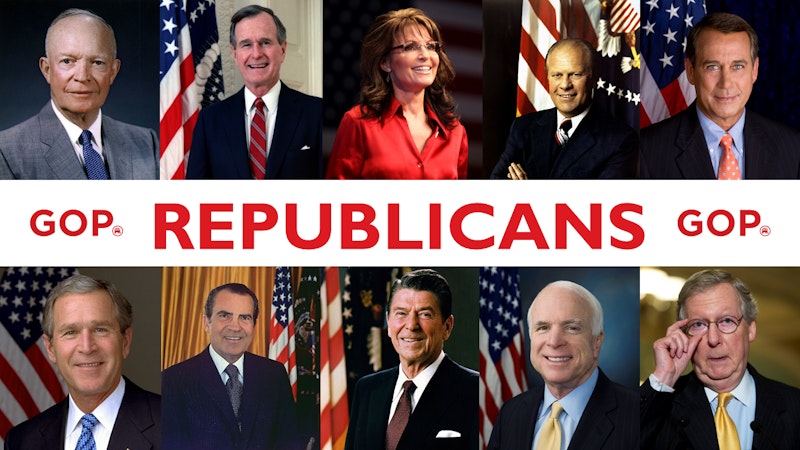Study Notes
The Republican Party
- Level:
- A-Level
- Board:
- AQA, Edexcel, OCR
Last updated 22 Mar 2021
The Republican Party, or Grand Old Party (GOP) is one of the two major political parties in the United States. The Republican Party is the party of Lincoln, Reagan and the Bush Dynasty, home of the American Right and member of the International Democratic Union.

Brief Republican History
The modern Republican Party was founded in 1854, by anti-slavery activists and became the main opposing force to the Democratic Party. Its core belief was that slavery was a moral and social evil and should, therefore, be eliminated. Their first President was Abraham Lincoln, elected on an anti-slavery platform. The Republicans remained popular until the McKinley Tariff 1890, which hurt their chances and swept the Democrats back to power. These wilderness years were over in 1896 with the election of McKinley as President and is seen as the Resurgence of Republican Dominance.
In the early 20th century, the Party established itself as the party of big business, this is mainly down to the actions of Theodore Roosevelt. The Party enjoyed a period of prolonged power from 1921 through to 1933, with Harding, Coolidge and Hoover being elected easily. The party felt it was on a high through most of the 1920s until the Wall Street Crash in 1929.
Republicans entered a new wilderness with the election of Democrat Franklin Delano Roosevelt in 1933. This wilderness was briefly interrupted with the two term Eisenhower Presidency. Eisenhower had attempted to shift the party to a more moderate position, yet failed and by the 1970s this Liberal wing of the GOP had faded away. The Party did support much of the international work of Truman and Kennedy.
The later half of the 20th Century saw a new period of Republican Dominance from Nixon through to Bush. Despite the executive branch being controlled by Republicans, Congress was frequently controlled by Democrats. It is interesting to note that since 1992 the Republican Party has only ever won the popular vote in Presidential elections once, and that was in 2004.
Republican Presidents
The Republican Party has had 18 Presidents, governing for a total of 88 years. Their first President was Abramhal Lincoln, and the most recent being George W Bush. Four of them managed to see out two full terms, and five a single term. Below is a list of all the Republican Presidents in order.
- Abraham Lincoln (1861-1865) - Assassinated
- Ulysses S. Grant (1969- 1877)
- Rutherford B. Hayes (1877-1881)
- James A. Garfield (1881-1881) - Died before completing first term.
- Chester A. Arthur (1881-1885)
- Benjamin Harrison (1889-1893)
- William McKinley (1897-1901) - Assassinated
- Theodore Roosevelt (1901-1909)
- William Howard Taft (1909-1913)
- Warren G Harding (1921-1923) - Died in Office
- Calvin Coolidge (1923-1929)
- Herbert Hoover (1929-1933)
- Dwight D Eisenhower (1953-1961)
- Richard M Nixon (1969-1974) - Resigned over Watergate Scandal
- Gerald Ford (1974-1977)
- Ronald Reagan (1981-1989)
- George H W Bush (1989-1993)
- George W Bush (2001-2009)
Electoral Performance
Since 1950, the Republican Party has controlled the House of Representatives for a total of 20 years. The longest continuous control was from 1994 through to 2006. During the same period in the Senate, they have controlled the chamber for 22 years. Some Republican Presidents have faced a hostile Congress for their entire administration such as Richard Nixon and Gerald Ford.
Policy Platform
The Republican Party is a conservative party, which includes all factions of conservatism from the moderates through to the religious right. As a conservative party they believe strongly in free markets and their ability to lead to economic prosperity. Above all else, government should not run welfare and the Republicans advocate the reduction in the size of the Federal Government.
Their approach to economics can be summed up as follows: Low tax, low welfare, low state spending. Welfare in Republican eyes is a safety net and is best distributed using charities rather than the Federal Government. In healthcare the party opposes government run healthcare systems such as Obamacare, yet their record on other aspects of Social Security is mixed with some support and some opposition.
Republicans are also opposed to trade unions and increases in the minimum wage.
On the constitution, Republicans adopt a strict constructionist approach and as a result, oppose judicial activism. Republicans would, therefore, be critical of judicial decisions such as Roe v Wade.
In regards to Social Policy, Republicans are generally seen as socially conservative, but does have factions within this. Generally Republicans are opposed to: Same-sex marriage, abortion, the legalisation of marijuana, stem cell research, gun control, illegal immigration and affirmative action for women and minorities.
However, Republicans do support: gun ownership, school choice through the use of vouchers, military spending, and the use of covert operations and premptive wars.
Find Out More
You might also like
Filibuster
Study Notes
Constitutional Interpretation
Study Notes
Judicial Restraint
Study Notes
Swing State
Study Notes
US Political Advert Round Up
17th January 2016
Policy Labs
Study Notes

Political Partisanship in the USA and COVID-19
16th September 2020
I would encourage Politics students to engage with this long read
22nd January 2021